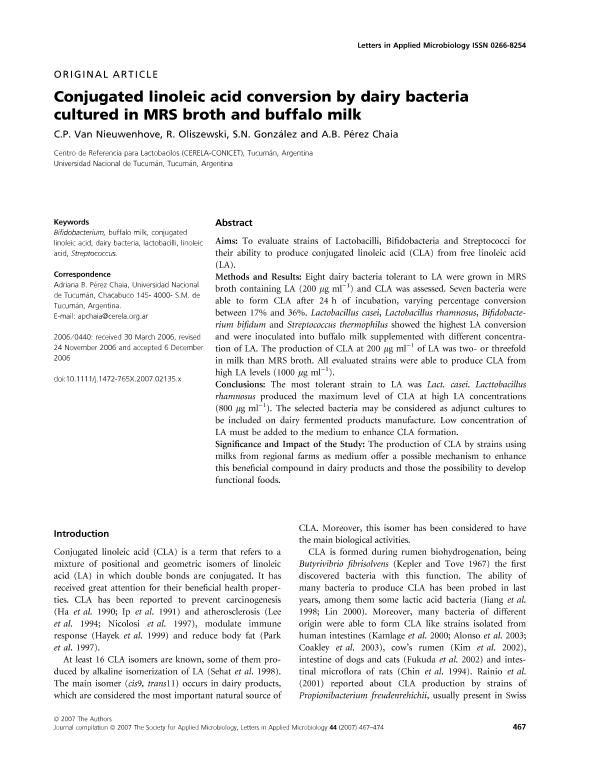Artículo
Conjugated linoleic acid conversion by dairy bacteria cultured in MRS broth and buffalo milk
Van Nieuwenhove, Carina Paola ; Oliszewski, Ruben
; Oliszewski, Ruben ; Gonzalez, Silvia Nelina
; Gonzalez, Silvia Nelina ; Perez Chaia, Adriana Beatriz
; Perez Chaia, Adriana Beatriz
 ; Oliszewski, Ruben
; Oliszewski, Ruben ; Gonzalez, Silvia Nelina
; Gonzalez, Silvia Nelina ; Perez Chaia, Adriana Beatriz
; Perez Chaia, Adriana Beatriz
Fecha de publicación:
05/2007
Editorial:
Wiley Blackwell Publishing, Inc
Revista:
Letters in Applied Microbiology
ISSN:
0266-8254
e-ISSN:
1472-765X
Idioma:
Inglés
Tipo de recurso:
Artículo publicado
Clasificación temática:
Resumen
Aims: To evaluate strains of Lactobacilli, Bifidobacteria and Streptococci for their ability to produce conjugated linoleic acid (CLA) from free linoleic acid (LA). Methods and Results: Eight dairy bacteria tolerant to LA were grown in MRS broth containing LA (200 μg ml-1) and CLA was assessed. Seven bacteria were able to form CLA after 24 h of incubation, varying percentage conversion between 17% and 36%. Lactobacillus casei, Lactobacillus rhamnosus, Bifidobacterium bifidum and Streptococcus thermophilus showed the highest LA conversion and were inoculated into buffalo milk supplemented with different concentration of LA. The production of CLA at 200 μg ml -1 of LA was two- or threefold in milk than MRS broth. All evaluated strains were able to produce CLA from high LA levels (1000 μg ml -1). Conclusions: The most tolerant strain to LA was Lact. casei. Lacttobacillus rhamnosus produced the maximum level of CLA at high LA concentrations (800 μg ml-1). The selected bacteria may be considered as adjunct cultures to be included on dairy fermented products manufacture. Low concentration of LA must be added to the medium to enhance CLA formation. Significance and Impact of the Study: The production of CLA by strains using milks from regional farms as medium offer a possible mechanism to enhance this beneficial compound in dairy products and those the possibility to develop functional foods.
Archivos asociados
Licencia
Identificadores
Colecciones
Articulos(CERELA)
Articulos de CENTRO DE REFERENCIA PARA LACTOBACILOS (I)
Articulos de CENTRO DE REFERENCIA PARA LACTOBACILOS (I)
Citación
Van Nieuwenhove, Carina Paola; Oliszewski, Ruben; Gonzalez, Silvia Nelina; Perez Chaia, Adriana Beatriz; Conjugated linoleic acid conversion by dairy bacteria cultured in MRS broth and buffalo milk; Wiley Blackwell Publishing, Inc; Letters in Applied Microbiology; 44; 5; 5-2007; 467-474
Compartir
Altmétricas



